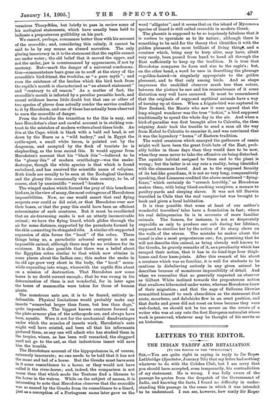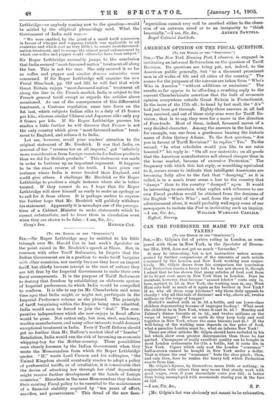(TO THE EDITOR OD THE " SPECTATOR:1
Sin,—You are quite right in saying in reply to Orr Rope, Lethbridge (Spectator, January 7th) that my letter had nothing whatever to do with the Cobden Club, but I am sorry that you should have accepted, even temporarily, his contradiction of my statement. He is wrong. I was fully aware of the passage he quotes from the despatch of the Governmez. t of India, and knowing the facts, I found no difficulty in under- standing this passage in the sense in which it was intended to be understood. I can see, however, how easily Sir Roper
" We were enabled, by the grant of a small tariff concession in favour of vinegar and copperas (which was applicable to all countries and which cost us very little), to secure most-favoured- nation treatment, and to escape the almost penal enhancement to which our coffee and pepper would otherwise have been subject."
Sir Roper Lethbridge excusably jumps to the conclusion that India secured " most-favoured-nation " treatment all along the line. This is not the case. She only secured it so far as coffee and pepper and similar denrees coloniales were concerned. If Sir Roper Lethbridge will examine the new Fiscal Blue-book, pp. 319 and 320, he will find that while Great Britain enjoys " most-favoured-nation " treatment all along the line in the French market, India is subject to the French general tariff except as regards the articles above mentioned. As one of the consequences of this differential treatment, a Customs regulation came into force on the 1st inst. which subjects Indian silks to a duty of 15 francs per kilo., whereas similar Chinese and Japanese silks only pay 9 francs per kilo. If Sir Roper Lethbridge pursues his studies a little further he will discover that France is not the only country which gives " most-favoured-nation " treat- ment to England, and refuses it to India.
Let • me, however, recall your readers' attention to the original statement of Mr. Brodrick. It was that India, on account of her " revenue tax on all imports," got " infinitely more consideration from foreign countries for Indian products than we did for British products." This statement was made in order to buttress up an important argument. It happens
to be the exact reverse of the truth. I have given one instance where India is worse treated than England, and could give others. I challenge Mr. Brodrick or Sir Roper Lethbridge to produce a single instance where she is better treated. If they cannot do so, I hope that Sir Roper Lethbridge will show himself as ready to make an apology as to call for it from others. It is perhaps useless to express the further hope that Mr. Brodrick will publicly withdraw his statement. Apparently it is nowadays one of the preroga- tives of a Cabinet Minister to make statements which he cannot substantiate, and to leave them in circulation even when they are shown to be false.—I am, Sir, &c., Gray's Inn. HAROLD COX.







































 Previous page
Previous page